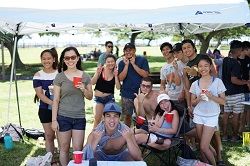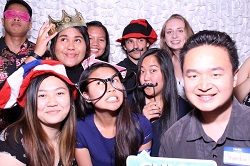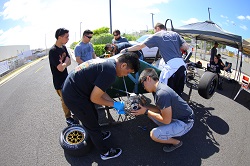Student chapters of professional engineering societies are active at the College of Engineering, and all students are encouraged to participate. Honorary societies are represented in all three departments. The Engineers’ Council of University of Hawai‘i (ECUH) coordinates the activities of these student organizations.
College-Wide Organizations
![]()
American Indian Science and Engineering Society
We are the American Indian Science and Engineering Society. Our mission is to increase the representation of American Indians, Alaskan Natives, and Native Hawaiians in Science, Technology, Engineering, and Math. Here at the University of Hawaii at Mānoa, students of any ethnic background or major are welcome to join. We aim to be active in our community by volunteering and hosting events that promote minorities in STEM.
![]() Engineers’ Council of the University of Hawai‘i
Engineers’ Council of the University of Hawai‘i
Engineers’ Council of the University of Hawai‘i (ECUH) is an organization comprised of members of all organizations in the College of Engineering. ECUH members have the responsibility to coordinate events within the College of Engineering for all disciplines and to promote communication between the three disciplines within the college.
Society of Women Engineers (SWE) is a non-profit educational service organization dedicated to creating awareness of society’s need for women engineers and encouraging young women to consider engineering as a career. The organization’s objectives are clear, and as relevant today as they were more than 50 years ago. They are:
-
-
-
- Stimulate women to achieve full potential in careers as engineers and leaders
- Expand the image of the engineering profession as a positive force in
improving the quality of life - Demonstrate the value of diversity
-
-
Despite the organization’s focus on women, SWE encourages all engineering students (of either gender and in any field of discipline) to join the group.
Civil Engineering Organizations

![]() American Society of Civil Engineers
American Society of Civil Engineers
The objective of the American Society of Civil Engineers (ASCE) student chapter is to encourage its members to study civil engineering and/or civil technology and to advance the civil engineering profession. Members prepare, present, and discuss papers; conduct chapter activities; entertain guest speakers; and visit engineering works under construction. They get involved with community service projects requiring the collective efforts of many, and read publications of the Society. These and many other chapter activities stimulate broad personal development with an early professional consciousness while providing the opportunity to participate actively in their civil engineering or technology education.
Chi Epsilon (XE) is the Civil Engineering Honor Society. Dedicated to maintaining and promoting the status of civil engineering as an ideal profession, XE was organized to recognize the characteristics of the individual civil engineer deemed to be fundamental to the successful pursuit of an engineering career and aid students in the development of those characteristics.
Electrical Engineering Organizations

 Institute of Electrical and Electronics Engineers
Institute of Electrical and Electronics Engineers
The Institute of Electrical and Electronics Engineers (IEEE) student chapter is an engineering interactive organization. Although their focus is on Electrical Engineering, membership is open to students of all majors. Group activities include company tours and guest speakers that enhance the students’ professional awareness. Other fun activities include attending sporting events as well as organizing picnics and parties.
Eta Kappa Nu (HKN) is a national honor society for electrical and computer engineers. The Delta Omega Chapter at the University of Hawai‘i at Mānoa is actively involved in tutoring services, service projects, and faculty soirees. Membership is by invitation-only and requires a top-10 percent class standing and successful completion of an eight-month pledging period.
Mechanical Engineering Organizations
![]() American Society of Heating, Refrigerating and Air-Conditioning Engineers
American Society of Heating, Refrigerating and Air-Conditioning Engineers
ASHRAE offers student members the opportunity to interact and ‘network’ with members of the local ASHRAE Chapter, to participate in technical tours, learn from guest speakers, present technical papers, and to interact with other students with the same career interests.
![]() American Society of Mechanical Engineers
American Society of Mechanical Engineers
The American Society of Mechanical Engineers (ASME) is an education and technical organization that encourages the development of new technologies while helping to solve the challenges of an increasingly technological society. The focus of the student section is:
-
-
-
- To provide students with the opportunity to begin their professional careers by joining a professional engineering society
- To inform students about recent developments in the engineering field through publication, field trips, and meetings
- To promote fellowship and interactions with other student sections as well as professional sectors of the society
-
-
Pi Tau Sigma is a national honorary mechanical engineering fraternity. The Hawai‘i Chapter of Sigma Pi is actively involved in tutoring services and monitoring the ME Computer Lab. PTS Hawai‘i strives to uphold the high ideals of the engineering profession and stimulate interest in mechanical engineering. Membership to this organization is invitation-only and requires a certain grade point average requirement and the completion of a semester pledging period.

![]() Society of Automotive Engineers
Society of Automotive Engineers
Formula SAE is an international collegiate competition, in which students from universities around the globe work in teams to design, build, and compete a formula-style racecar. This type of competition requires students to use classroom knowledge for a real life project. By the end of the project, students will have acquired skills, knowledge, and abilities in which no engineering, automotive, or business course could replace.
Would you like to contact one of our Student Organizations or Vertically Integrated Projects with an inquiry or collaboration request? Download the 2024-2025 Student Organization & VIP Contact List.
Funding
Requests for funding for SPGs (Student Project Grants) and REUs (Research Experience for Undergraduates) must be e-mailed to their respective department chairs. Requests must include:
- Name of organization, name of requester and contact information;
- Name of project/activity, breakdown of anticipated costs, amount requested from the College of Engineering ($7,000 maximum), amount to be fundraised from non-College sources, previous funding (if any), estimated date of expenditure of funds;
- A brief explanation of how participation in the activity/project will benefit the College; and
- Name and approval of faculty adviser
Amount of Matching Funding Available from the College
College funds are intended to provide additional funding for approved expenses above what is fund-raised from sources external to the College (e.g., Student Activity Program Fee Board, companies, car washes, bake sales—but not contributions from department operating funds). The Dean’s office will contribute up to one-third of the total approved expenses ($7,000 maximum), which must be matched by two-thirds from fundraising.
Examples:
- Expenses are at least $18,000 and $12,000 was raised: The College will contribute up to $6,000.
- Expenses are $15,000 and $12,000 was raised: The College will contribute up to $3,000.
- Expenses are $10,000 and $12,000 was raised: Support from the College is not needed.
The College matching funds are intended to offset approved expenses and requests should be sent to ECUH, who will organize files and forward to the College.
New organizations can expect up to $1,000 without a need for fundraising. Projects that provide positive exposure to the College, such as student competitions on the mainland, will be favored.
At the time receipts for reimbursement are submitted, the source and amount of all external funds fundraised and deposited, the amount requested from the College, and a signed approval of the faculty advisor must be submitted. Travel requests must specify the name of the faculty advisor, or substitute, who will accompany the group if there is any potential for liability (not necessary for conferences).
Because the Society of Women Engineers and Engineers Without Borders may be comprised of students outside of the College, it is expected that other units will cover travel funding for non-College students.
Travel
Undergraduate students may receive funding to present research or student projects or to participate in student-led conferences abroad. Permission to travel must be obtained before travel begins, and a travel completion form must be submitted afterwards. Visit the Student Services Office in Holmes 250 for more information.


